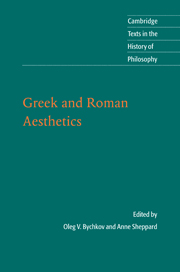Book contents
- Frontmatter
- Contents
- Preface
- Introduction
- Chronology
- Further reading
- Note on the texts and the translations
- Greek and Roman Aesthetics
- Gorgias
- Plato
- Xenophon
- Aristotle
- Philodemus
- Cicero
- Seneca
- Longinus
- Philostratus
- Philostratus the Younger
- Aristides Quintilianus
- Plotinus
- Augustine
- Proclus
- Index
- CAMBRIDGE TEXTS IN THE HISTORY OF PHILOSOPHY
Plato
Published online by Cambridge University Press: 05 June 2012
- Frontmatter
- Contents
- Preface
- Introduction
- Chronology
- Further reading
- Note on the texts and the translations
- Greek and Roman Aesthetics
- Gorgias
- Plato
- Xenophon
- Aristotle
- Philodemus
- Cicero
- Seneca
- Longinus
- Philostratus
- Philostratus the Younger
- Aristides Quintilianus
- Plotinus
- Augustine
- Proclus
- Index
- CAMBRIDGE TEXTS IN THE HISTORY OF PHILOSOPHY
Summary
Ion
533d–536d
socrates: This ability of yours to talk well about Homer, which I spoke of just now, is not a skill but a divine force which moves you. It is like the force in the stone which Euripides called Magnesian, but which most people call Heraclean. For indeed this stone not only attracts iron rings themselves but also passes its force on to the rings so that they in their turn can do the same as the stone and attract other rings. Sometimes there is a very long chain of rings and bits of iron, all attached to each other; the force which links them all together comes from that stone. In just this way the Muse herself makes people inspired, and they in turn inspire others, forming a chain of inspiration. For all the good epic poets recite all these fine poems not through skill but because they are inspired. The same goes for the good lyric poets: just as those who celebrate the Corybantic rites are not in their right minds when they dance, so too the lyric poets are not in their right minds when they compose these fine poems; whenever they embark on harmony and rhythm, they act like Bacchants and are possessed. Just as Bacchants, when possessed, draw honey and milk from rivers and are not in their right minds, so the lyric poets' soul does this too, as they themselves say.
- Type
- Chapter
- Information
- Greek and Roman Aesthetics , pp. 5 - 74Publisher: Cambridge University PressPrint publication year: 2010



